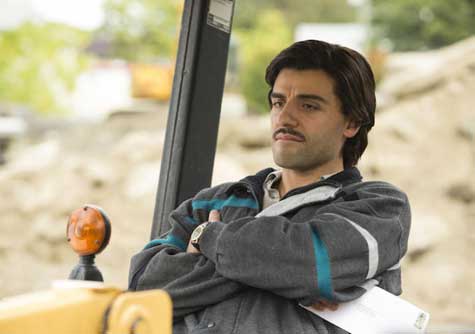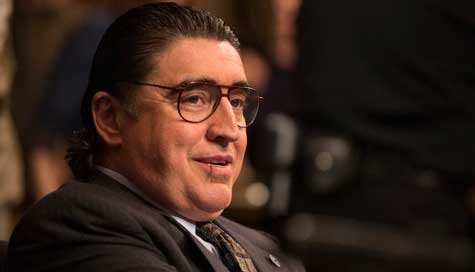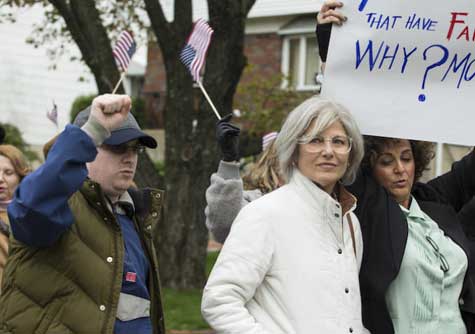
The meaty middle of Show Me a Hero begins and ends in the thick of battle, as Nick learns the hard way that everyone loves a winner and nobody wants to hitch their wagon to a loser. The embattled young mayor (played by Oscar Isaac, of A Most Violent Year) is on the phone to Albany, but the Democratic Party machine that loved him when he was a surprise winner of the Yonkers mayoral election has no time for him now that the voters have turned on him, because no one can give them what they want: a way to fight Judge Sand’s order for Yonkers to build low-income housing outside of the area they’ve segregated poor minorities into for decades, a square mile of projects that have become a haven for crime.
Nick calls on Mario Cuomo, the “Great White Hope” of the liberals in the late ‘80s, whose star fizzled before it had a chance to shoot. “I could use a little hope!” he yells into the phone, but he’s on his own. And things are beginning to get ugly, as the Save Yonkers campaign gets more desperate. Every appeal has been denied, and Albany’s only help is to send an “emergency team”who all but takes over the city government, demanding layoffs of 600 city workers so they can keep the fire and police departments running once the judge’s contempt order goes into effect, fining Yonkers a million dollars a day. Nick uses the layoff threats to his advantage; it makes the judge’s order real, ruining the lives of 600 families to satisfy the demands of angry voters. Vice Mayor Henry Spallone (played by Alfred Molina with great unctuousness, he must’ve foreseen the future, because he uncannily channels Donald Trump) never wavers, but Nick manages to pass the vote to comply with the judge’s order and save the city from bankruptcy. The voters already hate him for not shouting rhetoric, and telling him this is a bitter pill they will be forced to swallow. “I’m finally on the right side of something,” he says, but he has little time to enjoy it. Spallone sees the blood in the water, and Yonkers only elects mayors to a 2 year term.

The families in public housing need their hero. Carmen (Ilfenesh Hadera) is busting her behind refinishing old furniture, and brings her children back from the Dominican Republic one flight at a time. Doreen (Natalie Paul) sees only despair as she tries to raise her son alone, while housing bounces her all the way to Yorktown Heights because there’s no room at the inn in Yonkers for a single mother. Norma’s health keeps failing, and her son talks her into getting a home nurse paid by Medicare, but they are too afraid to visit her at her apartment in the projects. While we wait for the city to accept the inevitable, more children are born into the projects, and Oscar Newman (Peter Riegert), the housing coordinator, fights to keep his original vision of small parcels of 24 units of single family dwellings, and explains his reasoning in a classic David Simon infodump, distilled like whiskey into a solution for this complex problem: “Public housing tenants are like anybody else, they will zealously guard and care for what is theirs. It’s the common areas that become a no-man’s land where vandalism, loitering, and petty crime will grow.” His reasoning proved out, according to Lisa Belkin, who wrote the book this show is based on; for a short recap, read her article “The Painful Lessons of the Yonkers Housing Crisis,” for the NY Times.

Mary Dorman (Catherine Keener) needs a hero, as well. She supported Nick, but fell behind Spallone as Nick decided to accept the inevitable and transition the city into the future. Nick has a chance, until Spallone switches parties and runs as a Republican; the tide turns against him, and he finds himself graciously leaving office early just like his predecessor did. But Spallone can’t give the “Save Yonkers” voters what they want, either; they soon learn that he talks the talk, but is forced to walk the walk, after the Supreme Court refuses to hear their appeal. Nick loses himself in repairing an old house with a great view, with his supportive girlfriend Nay (Carla Queveda, The Secret in Their Eyes). “I know it was a lonely fight,” everyone tells him, as he walks out like a sacrificial lamb. He’s still chugging Maalox and visiting his father’s grave, and we know from both the show’s title (show me a hero, and I’ll write you a tragedy) and history that this will all end in tears, but for now, our likable political scrapper is still kicking, fighting the fight, and embracing his legacy, visiting the construction site of the first new low-income housing. He sees Spallone faltering, and the revolving door of local politics swings his way again. Nick is a finalist for the JFK Profiles in Courage Award, for his principled stance, and with that he may get the support he needs to be Mayor a second time. “No one sensible would submit themselves to this,” he said, and maybe a he has more heart than sense.
We end on a down note, in this Empire Strikes Back of the trilogy; Nick is in exile, Mary Dornan is disillusioned with the Save Yonkers campaign as their protests get openly racist with lynched effigies, and Doreen, Norma, and Carmen need to escape the quicksand of the projects. We end with the ugly reality of slurs spraypainted on the new housing, before the siding is even put on. I said it last time, but the direction really shines here. We have a handful of storylines but I was never confused. Simon’s quick writing, and Haggis’s efficient, artful cuts make the complex story easy to follow, and bring humanity to what could be a story of caricatures and messages masquerading as people. In the two-episode finale next week, we could use a little hope. Is Nick’s sacrifice worth it? Do baby Johnny and little Felipe get a better life, out of the projects?
Thomas Pluck is the author of the World War II action thriller Blade of Dishonor, Steel Heart: 10 Tales of Crime and Suspense, and Hot Rod Heart: A Noir Novelette. He is also the editor of the anthology Protectors: Stories to Benefit PROTECT and hosts Noir at the Bar in Manhattan. His work has appeared in The Utne Reader, PANK Magazine, McSweeney's Internet Tendency, Hardboiled, Needle: A Magazine of Noir, Crimespree, and numerous anthologies, including Dark City Lights, edited by Lawrence Block. You can find him online and on Twitter as @thomaspluck.
Read all of Thomas Pluck's articles for Criminal Element.

It is a good show. The same things that where happening then is still happening now. Things are a little better but not so much.